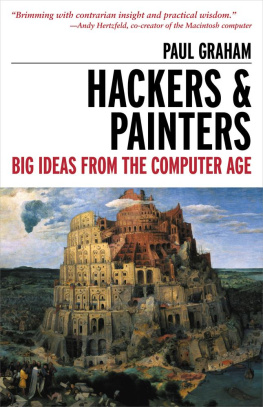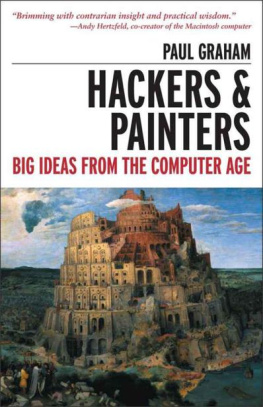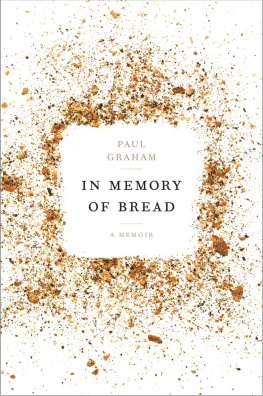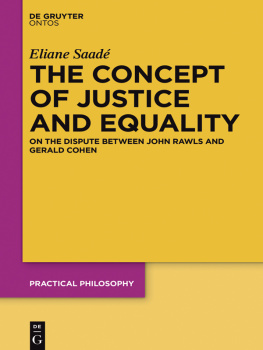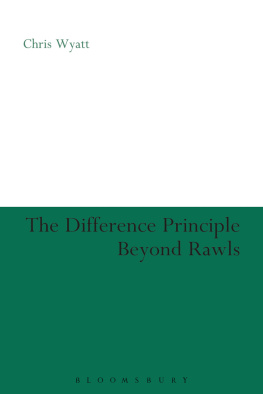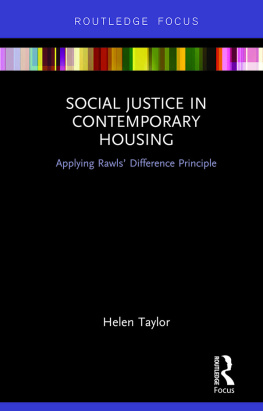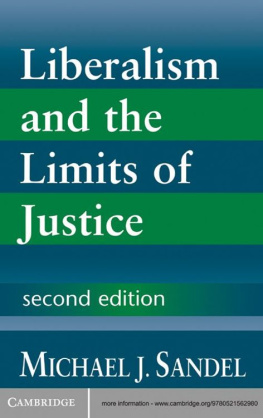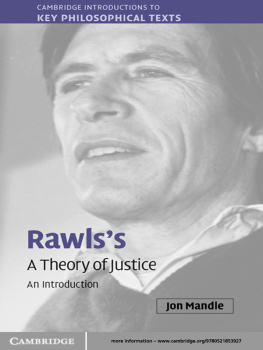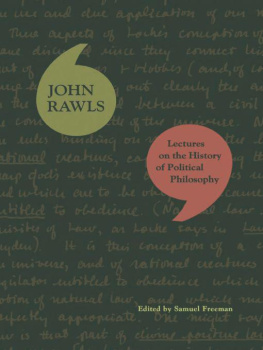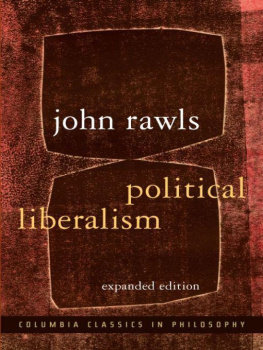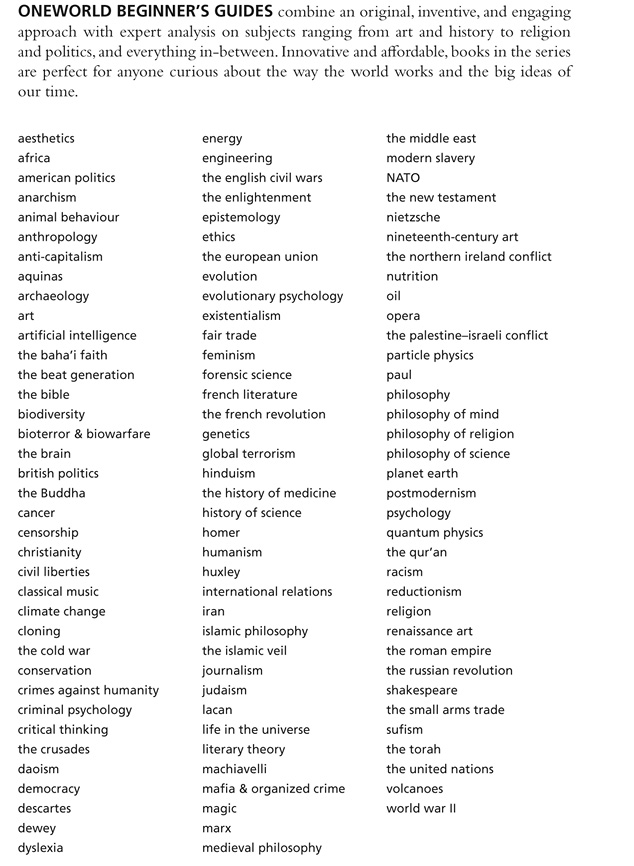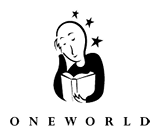Rawls
A Beginners Guide
Rawls
A Beginners Guide
Paul Graham
A Oneworld Book
First published as Rawls: Oneworld Thinkers by Oneworld Publications, 2007
This ebook edition published by Oneworld Publications, 2016
Copyright Paul Graham 2007, 2016
All rights reserved
Copyright under Berne Convention.
A CIP record for this title is available
from the British Library
ISBN 978-1-78074-811-5
eISBN 978-1-78074-812-2
Typeset by Jayvee, Trivandrum, India
Oneworld Publications
10 Bloomsbury Street
London WC1B 3SR
England
Contents
John Rawlss A Theory of Justice (1971) is one of the most influential books in moral and political philosophy published within the last one hundred years. It is read not just by philosophers, but also by those working in the fields of political science, law and social policy. His later works Political Liberalism (1993) and The Law of Peoples (1999) further expand his audience, as they raise issues of importance to theologians, particularly those working in the field of comparative religion, and to theorists of international relations. The aim of this book is to provide a comprehensive commentary on Rawls, extending from his earliest articles from the 1950s, to work published just before his death in 2002 and to writings that have appeared posthumously. Although his books and articles cross disciplinary boundaries in terms of their relevance, there is a focus to Rawlss work that distinguishes him from many other philosophers: he was concerned above all with the fair distribution of goods in society. Those goods are not simply material resources, such as income, but also freedom and political power. This concern with distributive justice, while seemingly narrow, opens up many important debates. These include: debates about the nature of the goods to be distributed; the relationship between freedom, equality and efficiency; gender relations; the moral justification of political principles and the problems of justifying such principles in a culturally and religiously diverse society; the conflict between moral autonomy and state coercion; and issues of global justice and human rights.
While Rawlss work is of great relevance to politics and society, it is expressed in language that may appear excessively abstract and at times daunting. There is a danger that a reader interested in questions of distributive justice will become disillusioned. I have tried to strike a balance between on the one hand clarifying and in places simplifying Rawlss arguments, and on the other engaging with the complexities of his thought. I have also balanced exegesis and criticism: readers want to know what Rawls argued, not what a commentator thinks Rawls should have said. However, a good part of Rawlss importance lies in the debates which he sparked, and much can be gained by exploring critical perspectives on Rawls. Through these critical perspectives I have attempted to convey my view of his arguments and of his ultimate significance as a political philosopher.
In writing this book I have benefited from the support and intellectual stimulation given by my former students and colleagues at Glasgow University, most especially Michael Lessnoff. Since the publication of the first edition in 2007 I have moved to Buckingham University. Given that Buckingham was founded on free market, libertarian ideas this has provided an interesting environment in which to discuss Rawlss left liberal egalitarian ideas. I would like to acknowledge in particular the support given to me by Martin Ricketts. In addition, my teachers at the London School of Economics, where I was a graduate student, have shaped my ideas. The guidance provided by Oneworld has been invaluable. Victoria Roddam, Mark Hopwood and Martha Jay assisted me with the first edition, and Mike Harpley has helped me with the second edition. Finally, the encouragement of my parents, Douglas and Heather Graham, has been essential to the pursuit of my studies in political philosophy, and for that I am grateful.
A comment on the texts: all references are to the first edition of A Theory of Justice , which was published in the United States in 1971 and in the United Kingdom in 1972. As I shall argue, Rawls revised his ideas over subsequent decades and these changes were incorporated in a second edition of the book, published in 1999. Because I want to explain how his ideas changed I have decided to continue to reference the first edition. (It should be noted that the first edition was reissued in 2005.)
When John Rawls died aged 81 in November 2002, the obituaries in the major newspapers were surprisingly extensive. Surprising because Rawls was not a public intellectual. All who knew him stressed his shyness, modesty and determined avoidance of publicity. Rare were his interventions in current events. He gave only one personal interview in the course of his career, and that was to a small student magazine. He was reluctant to accept awards. But although the audience for his work has largely been confined to the academic world, the impact therein was of such a scale that by the time of his death glimmers of awareness of his significance had broken through to the wider world. His most important work A Theory of Justice (1971) has sold over 250,000 copies, and been translated into twenty languages. This book on Rawls is one more addition to a huge secondary literature, amounting to an estimated 5,000 works. Who then was John Rawls?
Rawls wrote A Theory of Justice during an unusually unstable period in American history at the height of the Vietnam War, and towards the end of the struggle for civil rights in the Deep South. Yet there is no direct reflection on these events in the book, and except for a brief footnote reference to Martin Luther King this holds even for his discussion of civil disobedience (Rawls 1972: 364 n ). It is true that as a professor at Harvard University he identified himself with the anti-war movement, but this activity, while not inconsistent with his writings, appears quite separate from them. Only towards the end of his life did he comment on a concrete political event, condemning, on the fiftieth anniversary, the atomic bombing of Nagasaki and Hiroshima (Rawls 1999b: 56572). The point is that biography is not essential to understanding Rawlss work. This contrasts with the cases where biography is helpful and illuminating (Wittgenstein), or essential (Nietzsche). However, readers coming to Rawls for the first time may find a personal sketch of the man useful in humanizing what could appear a dry argument, although the word dry is a mischaracterization of work that addresses fundamentally important political questions in an intellectually imaginative way, and that has generated a series of major philosophical debates. In writing this sketch I have relied upon accounts of those who knew and were influenced by him, such as Thomas Nagel and Martha Nussbaum, as well as an obituary by Ben Rogers, who in 1999 had interviewed Rawlss friends and colleagues. In addition, since the publication of the first edition of this book there has appeared in print Rawlss 1942 undergraduate senior thesis A Brief Inquiry into the Meaning of Sin and Faith together with a brief piece, entitled On my Religion, which was written in 1997 and intended largely for family and friends rather than wider circulation. I will say a few things about the former in Chapter 8, but the latter essay is of direct biographical interest.
Next page

